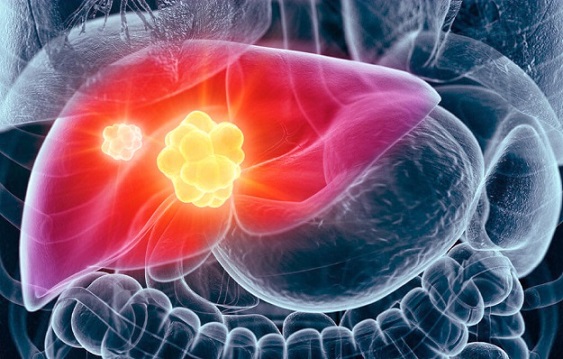Breaking! Study Finds That COVID-19 Accelerates Liver Cancer Growth and Spread Via Exosomes Derived from Syncytia!
Nikhil Prasad Fact checked by:Thailand Medical News Team Jan 09, 2025 3 months, 6 days, 11 hours, 25 minutes ago
Medical News: A groundbreaking study has uncovered how SARS-CoV-2, the virus responsible for COVID-19, may contribute to the rapid progression of hepatocellular carcinoma, a type of liver cancer. Conducted by researchers from Zhejiang University, the Beijing Institute of Biotechnology, and the Medical Supplies Center of People’s Liberation Army General Hospital, the study sheds light on the virus’ potential impact beyond respiratory illness. This discovery could have profound implications for cancer patients infected with COVID-19.
 Study Finds That COVID-19 Accelerates Liver Cancer Growth and Spread Via Exosomes Derived from Syncytia
SARS-CoV-2 and Cancer: A Lethal Intersection
Study Finds That COVID-19 Accelerates Liver Cancer Growth and Spread Via Exosomes Derived from Syncytia
SARS-CoV-2 and Cancer: A Lethal Intersection
COVID-19 has been widely recognized for its devastating impact on the lungs, but emerging evidence suggests that the virus has far-reaching effects. Cancer patients, particularly those with compromised immune systems due to chemotherapy or radiotherapy, are at greater risk of severe outcomes. The virus appears to exploit this vulnerability, creating an environment that promotes tumor growth and spread.
This
Medical News report focuses on a novel mechanism where SARS-CoV-2’s spike protein (SARS-2-S) induces the formation of syncytia - large cells formed by the fusion of multiple cells. These syncytia produce exosomes, tiny vesicles that facilitate communication between cells. Researchers found that these exosomes can significantly accelerate the proliferation and metastasis of hepatocellular carcinoma cells.
How the Study Was Conducted
To explore this connection, scientists performed a series of advanced experiments using human liver cancer cells (Huh-7) and a patient-derived xenotransplantation (PDX) mouse model. These methods allowed for a comprehensive understanding of how SARS-2-S influences cancer progression.
Key experiments included:
-Syncytial Formation: Researchers mixed cells expressing ACE2 (the receptor for SARS-CoV-2) with cells expressing SARS-2-S. This led to the formation of syncytia, verified through advanced microscopy techniques.
-Exosome Isolation: Exosomes derived from these syncytia (Syn-Exos) were purified and analyzed. The team used cutting-edge tools such as nanoparticle tracking analysis and proteomic sequencing.
-Functional Analysis: The effects of Syn-Exos on cancer cell proliferation and migration were studied using assays such as colony formation, wound healing, and transwell migration tests.
-Animal Models: PDX mice were injected with lentiviruses containing SARS-2-S to mimic the virus’s impact. Tumor growth was monitored to confirm the in vivo relevance of their findings.
Major Findings
Exosomes and Cancer Progression
The study reveal
ed that Syn-Exos are rich in proteins that promote cell proliferation, migration, and metastasis. Proteomic sequencing identified 829 differentially expressed proteins in Syn-Exos compared to exosomes from control cells. Of these, 501 proteins were significantly upregulated.
Key pathways influenced by these proteins include:
-JAK/STAT Signaling: Activation of this pathway, particularly through the phosphorylation of STAT3, was strongly associated with tumor growth.
-MAPK Pathway: Proteins in this pathway were linked to enhanced cell proliferation and survival.
-Metastasis-Related Proteins: Several proteins, including TOMM34 and RACK1, were significantly increased, correlating with greater tumor invasiveness.
In Vitro and In Vivo Results
In laboratory experiments, Syn-Exos markedly increased the proliferation and migration of Huh-7 liver cancer cells. This was demonstrated through colony formation assays and transwell migration tests. Similarly, in PDX mice, tumors injected with SARS-2-S showed accelerated growth and larger tumor volumes compared to controls.
One of the most striking observations was the increase in syncytia within tumor tissues of SARS-2-S-treated mice. These syncytia were directly linked to enhanced secretion of tumor-promoting exosomes.
Implications and Conclusions
The study’s findings highlight a previously unrecognized mechanism by which COVID-19 may exacerbate cancer progression. Specifically, SARS-2-S induces syncytia formation, which in turn generates exosomes that foster a pro-tumor environment. This discovery opens new avenues for research and treatment, particularly for cancer patients affected by COVID-19.
The implications are profound. For instance:
-Targeting Exosomes: Therapies that inhibit the production or release of exosomes could potentially slow cancer progression.
-JAK/STAT Pathway Inhibitors: Drugs targeting this pathway may mitigate the tumor-promoting effects of SARS-2-S.
In conclusion, this research underscores the importance of understanding the multifaceted impact of SARS-CoV-2. Beyond causing respiratory illness, the virus appears capable of promoting cancer growth through complex cellular mechanisms. Future studies should explore whether similar effects occur in other cancer types and whether therapies targeting these pathways could improve outcomes for affected patients.
The study findings were published in the peer-reviewed journal: Frontiers in Cellular and Infection Microbiology.
https://www.frontiersin.org/journals/cellular-and-infection-microbiology/articles/10.3389/fcimb.2024.1415356/full
For the latest COVID-19 News, keep on logging to Thailand
Medical News.
Read Also:
https://www.thailandmedical.news/news/sars-cov-2-spike-protein-interacts-with-12-liver-proteins-reactivates-hbv-and-activates-pre-cancerous-pathways
https://www.thailandmedical.news/news/covid-19-worsens-existing-liver-disease-and-could-spur-liver-cancer-development
https://www.thailandmedical.news/news/breaking-covid-19-news-brazil-study-shows-that-most-long-covid-individuals-continue-to-sustain-damaged-liver-functions-up-to-20-months
https://www.thailandmedical.news/articles/coronavirus
